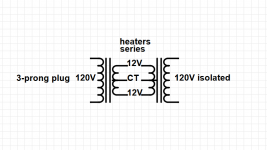Hello,
I'm new on this forum. I'm not an expert. I like tubes and most of my builds are simple SE tube amp. How would you ground the attached schematic ? I've seen many different layouts online. Would you add an artificial CT at T2 primary ? Should I ground the filaments 24V secondary or keep it floating ?
Tubes are in series (12A5, 6SF5, drop voltage resistor), full wave rectifier, 3-prong plug
Thanks in advance
Pat
I'm new on this forum. I'm not an expert. I like tubes and most of my builds are simple SE tube amp. How would you ground the attached schematic ? I've seen many different layouts online. Would you add an artificial CT at T2 primary ? Should I ground the filaments 24V secondary or keep it floating ?
Tubes are in series (12A5, 6SF5, drop voltage resistor), full wave rectifier, 3-prong plug
Thanks in advance
Pat
Attachments
Last edited:
Hi,
I'm assuming you are connecting 12A5 filaments in parallel for 6,3V to match 6SF5? And then a resistor to drop 24V to 12,6? You could use the center tap of the first transformer to get 12V for the filaments. And a full bridge rectifier for HT.
I'm assuming you are connecting 12A5 filaments in parallel for 6,3V to match 6SF5? And then a resistor to drop 24V to 12,6? You could use the center tap of the first transformer to get 12V for the filaments. And a full bridge rectifier for HT.
Hello MagicBus,
You're right, the 12A5 is special and can be wired for 6.3V or 12.6V
What if I want everything in series ?
Like a type 18, 6SF5 and a 12R resistor for instance.
Should I ground one leg of the 24V secondary or I keep it floating ?
You're right, the 12A5 is special and can be wired for 6.3V or 12.6V
What if I want everything in series ?
Like a type 18, 6SF5 and a 12R resistor for instance.
Should I ground one leg of the 24V secondary or I keep it floating ?
On second glance, my previous recommendation won't work either because 12A5 in parallel draws double the current. To get everything in series, they need to be for same voltage and current. Dissimilar tubes can be wired in parallel with drop resistors if necessary. For tubes that work on different voltage but draw the same current -like your examples- you could try a 0,3A constant current source, but as far as I can tell, this works better with tubes that are designed for current regulation.
